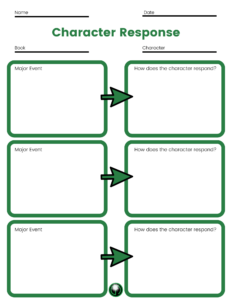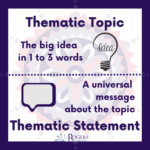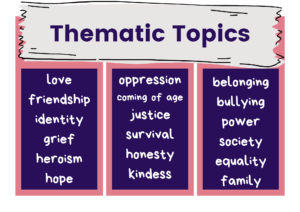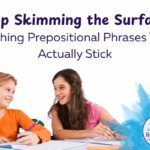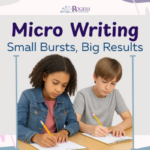Prerequisite Learning
The first step to finding an implicit theme in a fictional text is for students to gain a solid understanding of story elements. The students should be able to discuss the characters, setting, problem, and solution. Truth is, fictional stories are more about who is affected by what is happening than about what is actually happening! Students must understand a character’s feelings and traits, what motivates them, and how they react to different situations that arise. This will help your students identify the problem and solution in the story and will eventually lead them to consider the main idea, topic, and theme.
A great way to see if the students understand these elements and can retell a story is to work through a “Somebody, Wanted, But, So” routine. This routine is modeled and included in our Jabari Jumps unit (and so much more!).
Start Small
Identifying themes in stories can be challenging for students. My general rule of thumb is to start small when introducing difficult concepts to students so they don’t have to jump right into the “heavy lifting.” The only skill I want them to master is finding a theme and I do not want to overwhelm them with complex reading at the same time. We can start by finding theme in a story that I’m reading out loud to them (like one of these mentor texts), or in a short film (such as Pixar Shorts), or even just in a picture.
3 Things Students Should Know About Theme
- A story can have more than one theme, and it usually does! There is often one major theme and many minor themes. During discussion, my goal is to honor correct answers from the students, whether they find the “major theme” or one of the “minor themes”. Afterward, we discuss all the themes presented, and determine which could be considered the major theme.
- You may not agree with the ideas represented by the theme, but that’s ok. For example, “slow and steady wins the race” may not necessarily be how you approach life, but can still be the story’s underlying theme.
- Themes are based on real-life ideals and lessons. Therefore, the theme doesn’t always work only in books. Typically, the character learns a lesson that can be applied to daily life.
Thematic Topic VS Thematic Statement
No matter how many literacy workshops I have presented, this seems to be the debate of choice. And it sure can get heated! I would like to consider the function of both the thematic topic and the thematic statement. The thematic topic is the big idea the story is about, whereas the statement is what the story conveys about the topic. Both are important and complicated for students to master.
Finding a Thematic Topic & Writing a Thematic Statement
- Decide on the topic. Students must first identify the topic of the story in order to make a thematic statement. Topics are broad, general concepts that can usually be expressed in one to three words. As students read, I ask them to consider what the character is dealing with or what they are experiencing. The main characters in Romeo and Juliet struggle with love. Therefore, love is the topic of the story. Another possibility is family/relationships. Just like with theme, there can be many topics in one story.
- Write the theme. For students to identify themes, they must consider story elements, the topic, and the lesson learned. Once my students have chosen the topic of the text, I have them consider the lesson the character learned or taught about that topic. Romeo and Juliet are in love, but their parents forbid the relationship. Ultimately, their love leads to a deadly outcome. Their lesson was that forbidden love is complicated and can have disastrous results. What message does the author convey to the readers that are applicable to real-life situations? Perhaps it is that ‘forbidden love inevitably has deadly consequences’. Bingo – that’s your theme!
